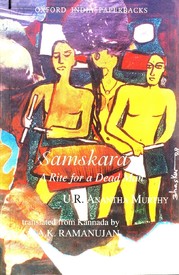U R Ananthamurthy’s Samskara
was written in the 1960s and I am thankful to my friend for suggesting that I
should read it. Originally written in Kannada the English translation is a very
good read. The story is quite famous and has been made into a film also. The
story revolves around the death of a
Brahmin man and the confusion around the
performance of his last rites .The man
is considered a heretic by the village Brahmins and was shunned by his
community when he was alive , yet his last rites cannot be performed by any non-Brahmin according to social rules. Life in the
tradition ridden village society is wonderfully portrayed and the conflicts amongst castes, the various
social taboos have been narrated in great detail.
 What I enjoyed reading most
was the close analysis of the psychological conflict waging in the mind of the
revered Brahmin pundit . Pranesacharya
the central protagonist is faced with a life changing situation which
completely destroys his peace of mind but in a way it also liberates him from
the fetters of tradition. He tries to escape from his known surroundings
initially but later on longs to return to his village and among his fraternity.
A celibate who shuns all kind of vices and
weaknesses , who deliberately marries a sick woman and seeks spiritual
release by serving her unfailingly, has a chance encounter with a low-caste
beautiful woman . The ancient texts which he knew by heart and used to recite
everyday suddenly come to life as he experiences reality in the shape of this
beautiful woman. He feels he is not a Brahmin anymore but does not repent it.
What I enjoyed reading most
was the close analysis of the psychological conflict waging in the mind of the
revered Brahmin pundit . Pranesacharya
the central protagonist is faced with a life changing situation which
completely destroys his peace of mind but in a way it also liberates him from
the fetters of tradition. He tries to escape from his known surroundings
initially but later on longs to return to his village and among his fraternity.
A celibate who shuns all kind of vices and
weaknesses , who deliberately marries a sick woman and seeks spiritual
release by serving her unfailingly, has a chance encounter with a low-caste
beautiful woman . The ancient texts which he knew by heart and used to recite
everyday suddenly come to life as he experiences reality in the shape of this
beautiful woman. He feels he is not a Brahmin anymore but does not repent it.
The social situation might
seem dated for urban tastes but anyone who has been brought up in conservative brahminical traditions cannot
fail to notice the striking resemblance to one’s own emotional, cultural and
social response to similar situations in life. Samskara can have a vice like grip on society
and sometimes can destroy human lives completely. Pranesacharya reminded me
about Tagore’s Gora. Both rediscover themselves .
No comments:
Post a Comment